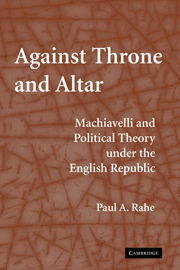Book contents
- Frontmatter
- Contents
- Acknowledgments
- Abbreviations and Brief Titles
- Introduction
- Prologue: Machiavelli in the English Revolution
- PART I MACHIAVELLI'S NEW REPUBLICANISM
- PART II REVOLUTIONARY ARISTOTELIANISM
- 3 The Classical Republicanism of John Milton
- 4 The Liberation of Captive Minds
- PART III MACHIAVELLIAN REPUBLICANISM ANGLICIZED
- PART IV THOMAS HOBBES AND THE NEW REPUBLICANISM
- Epilogue
- Index
4 - The Liberation of Captive Minds
Published online by Cambridge University Press: 21 July 2009
- Frontmatter
- Contents
- Acknowledgments
- Abbreviations and Brief Titles
- Introduction
- Prologue: Machiavelli in the English Revolution
- PART I MACHIAVELLI'S NEW REPUBLICANISM
- PART II REVOLUTIONARY ARISTOTELIANISM
- 3 The Classical Republicanism of John Milton
- 4 The Liberation of Captive Minds
- PART III MACHIAVELLIAN REPUBLICANISM ANGLICIZED
- PART IV THOMAS HOBBES AND THE NEW REPUBLICANISM
- Epilogue
- Index
Summary
From the detailed catalogue of the arguments presented in Niccolò Machiavelli's Discourses on Livy that John Milton drew up late in 1651 and early in 1652, there is one glaring omission. The Englishman attended not at all to the Florentine's critique of priestcraft. This can hardly be due to a lack of interest in the subject on his part. We know, in fact, that no subject was nearer and dearer to Milton's heart. Priestcraft was the principal theme of the pamphlets that poured forth from his pen in 1641 and 1642, and, as a concern, it was no less evident twenty-five years later in the very last book of his Paradise Lost, where it is featured as the preeminent predilection of sinful man in the Christian epoch that began with Christ's sacrifice on the cross.
Like Machiavelli, Milton was trained in classical rhetoric. He had read and taken to heart what Aristotle, Cicero, and Quintilian had had to say. He generally understood his immediate audience very well, and for sound rhetorical reasons he always couched his argument initially with an eye to what he took to be their abiding concerns. For this reason, in his early pamphlets, he addressed the question of ecclesiastical polity first and foremost on the basis of an appeal to the sanction of Scripture and, then, by means of an extended meditation on the history of the Christian church.
- Type
- Chapter
- Information
- Against Throne and AltarMachiavelli and Political Theory Under the English Republic, pp. 139 - 174Publisher: Cambridge University PressPrint publication year: 2008



